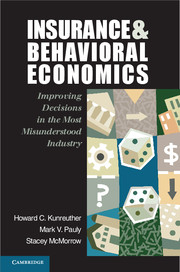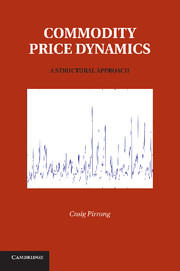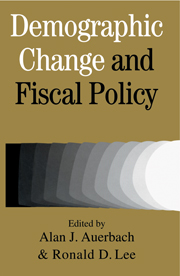Insurance and Behavioral Economics
Improving Decisions in the Most Misunderstood Industry
£81.00
- Authors:
- Howard C. Kunreuther, University of Pennsylvania
- Mark V. Pauly, University of Pennsylvania
- Stacey McMorrow, The Urban Institute
- Date Published: March 2013
- availability: Available
- format: Hardback
- isbn: 9780521845724
£
81.00
Hardback
Other available formats:
Paperback, eBook
Looking for an inspection copy?
This title is not currently available on inspection
-
This book examines the behavior of individuals at risk and insurance industry decision makers involved in selling, buying and regulation. It compares their actions to those predicted by benchmark models of choice derived from classical economic theory. Where actual choices stray from predictions, the behavior is considered to be anomalous. Howard C. Kunreuther, Mark Pauly and Stacey McMorrow attempt to understand why these anomalies occur, in many cases using insights from behavioral economics. The authors then consider if and how such behavioral anomalies could be modified to improve individual and social welfare. This book describes situations in which both public policy and the insurance industry's collective posture need to change. This may require incentives, rules and institutions to help reduce both inefficient and anomalous behavior, thereby encouraging behavior that will improve individual and social welfare.
Read more- Leading US risk analysts explain misunderstanding of insurance by buyers and offer productive examples of decision-making in real-world settings
- Explicitly contrasts classical economic models with new approaches from behavioral economics
- Highly accessibly written, offers positive prescriptions for better choices by consumers, industry and government involvement
Reviews & endorsements
'For too many people insurance is a mystery not worth solving. The authors of Insurance and Behavioral Economics shed valuable light on insurance products and providers in an insightful examination for the benefit of consumers, analysts, and students of the business. Even the industry would be wise to study the authors' research, conclusions, and recommendations.' Franklin Nutter, President, Reinsurance Association of America
See more reviews'A challenging and surprisingly engaging analysis of how insurance markets really function. You don't need to agree with all the analyses or recommendations … to recognize that this book is going to be widely read and broadly influential among insurers and regulators.' Leigh Ann Pusey, President and CEO, American Insurance Association
'This book presents a brilliant analysis of the insurance industry as it exists today and will evolve tomorrow. Insurance is fundamental to everything we do: we can see in this book how we can make much better use of it, to improve all of our lives.' Robert Shiller, Yale University
'Insurance is a vital tool for managing risk, but it is misunderstood by consumers, regulators, and industry executives in ways that greatly reduce its effectiveness. In this superb book, Kunreuther, Pauly, and McMorrow employ insights from behavioral economics to clarify these misunderstandings and point the way toward more rational use of insurance to enhance individual and societal welfare.' Paul Slovic, University of Oregon and author of The Feeling of Risk
'Regulators and policy makers have long known that consumers often make seemingly irrational choices when it comes to insurance. Drawing on behavioral economics, the authors provide a framework to understand insurance market anomalies - in both demand and supply - and to evaluate alternative policy prescriptions. Their work is a significant contribution to the discussion on how to best structure insurance regulation to the benefit of consumers and society.' Terri M. Vaughan, Chief Executive Officer, National Association of Insurance Commissioners
'Psychologically, it's hard for most of us to take the initiative on long-term, ill-defined risks. Three scholars - Howard C. Kunreuther and Mark V. Pauly of the University of Pennsylvania and Stacey McMorrow of the Urban Institute - show this in their book. But they argue that if we're aware of them, these psychological impediments can be reduced, and they urge the innovation of long-term risk management contracts that address the problem of climate change.' The New York Times
Customer reviews
Not yet reviewed
Be the first to review
Review was not posted due to profanity
×Product details
- Date Published: March 2013
- format: Hardback
- isbn: 9780521845724
- length: 342 pages
- dimensions: 235 x 156 x 23 mm
- weight: 0.67kg
- contains: 13 b/w illus. 10 tables
- availability: Available
Table of Contents
1. Purposes of this book
2. An introduction to insurance in practice and theory
3. Anomalies and rumors of anomalies
4. Behavior consistent with benchmark models
5. Real world complications
6. Why people do or do not demand insurance
7. Demand anomalies
8. Descriptive models of insurance supply
9. Anomalies on the supply side
10. Design principles for insurance
11. Strategies for dealing with insurance-related anomalies
12. Innovations in insurance markets through multi-year contracts
13. Publicly provided social insurance.Instructors have used or reviewed this title for the following courses
- Insurance Operations
Sorry, this resource is locked
Please register or sign in to request access. If you are having problems accessing these resources please email lecturers@cambridge.org
Register Sign in» Proceed
You are now leaving the Cambridge University Press website. Your eBook purchase and download will be completed by our partner www.ebooks.com. Please see the permission section of the www.ebooks.com catalogue page for details of the print & copy limits on our eBooks.
Continue ×Are you sure you want to delete your account?
This cannot be undone.
Thank you for your feedback which will help us improve our service.
If you requested a response, we will make sure to get back to you shortly.
×




